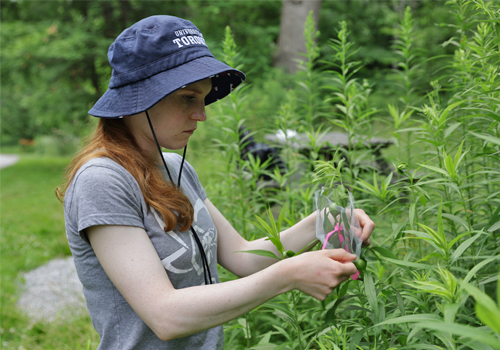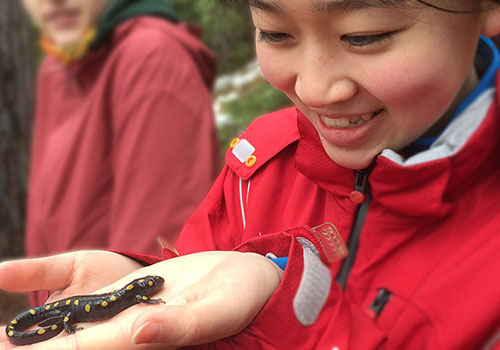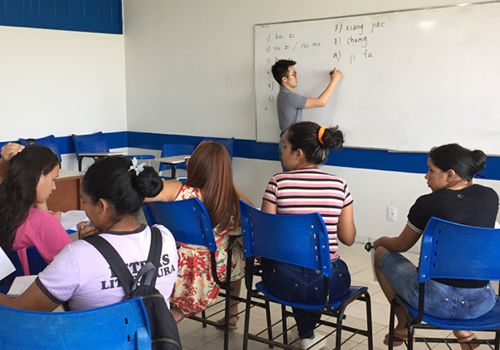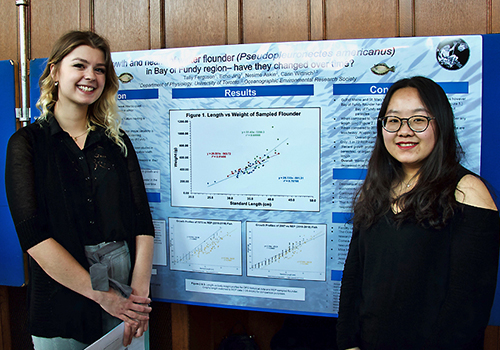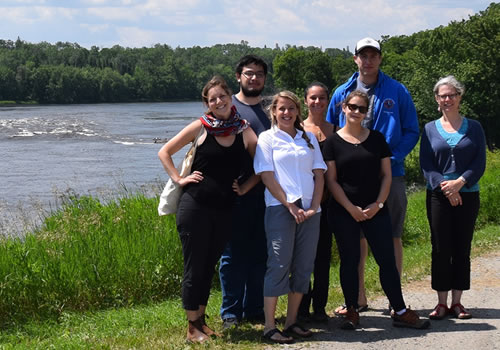Watch REP students on research trips in Puerto Rico, Kenya and Peru.
Travel While Conducting Real-World Research
The Research Excursions Program is a type of third-year course that enables experiential learning outside the classroom — and often outside of Canada. The REP provides off-campus travel opportunities, locally and globally, between May and August, when students join an instructor’s research team while earning 0.5 or 1.0 academic credits.
Benefits of the Research Excursions Program (REP)
By participating in an REP course, you will:
- Get a chance to travel, either locally or globally, with your peers and instructor
- Develop a close working relationship with your faculty supervisor, which could lead to future collaborations or reference letters for graduate school and job applications
- Learn research methods and further develop your research skills
- Get a unique perspective into research as you immerse yourself in a different location
- Have the chance to form lasting friendships with your group members
Who is Eligible to Participate?
REP courses are competitive and require an application. The course instructors select their REP students. Eligible students:
- Are full-time undergraduate degree students in the Faculty of Arts & Science — St. George campus
- Hold between 9.0-16.0 credits by the end of the upcoming April exam period
- Are new to the world of Faculty-funded international opportunities. Your chances of being accepted into REP courses are lower if you have previously received funds through REP, International Course Modules or Indigenous Course Modules.
Is There an Additional Cost?
REPs are subject to regular course tuition fees. There are no additional costs for travel and living expenses; these are paid by the Faculty of Arts & Science.
REP Courses
Summer 2025 REP Courses
The REP courses will be posted from February 10 to March 2, 2025, on the CLNx portal for students to consider and apply. You may be unable to view the REP course postings before the student application window opens on February 10, 2025.
The Summer 2025 REP courses have been posted on the CLNx portal for students to consider and apply until March 2, 2025. Should you encounter difficulties accessing the course postings on the CLNx, please contact us at experiential.artsci@utoronto.ca.
| Department | Professor | Research Project | Location |
|---|---|---|---|
|
ANT |
Bence Viola |
Palaeolithic hunter-gatherers at Grub Kranawetberg |
Viena and Stillfried an der March, Austria |
|
CrimSL |
Kamari Clarke |
Upending Transitional Justice: Rethinking the International Criminal Law |
Cali, Colombia |
|
EEB |
Benjamin Gilbert |
Fragmentation and fluctuations in plant biodiversity |
Koffler Scientific Research Reserve, Ontario, Canada
|
|
EEB
|
Benjamin Gilbert |
Invertebrate diversity and stability in a fragmented landscape |
Koffler Scientific Research Reserve, Ontario, Canada |
|
EEB
|
Luke Mahler |
The evolution of ecological diversity across neotropical lizard communities |
Quito, Ecuador and 4 localities across Ecuador |
|
EEB
|
Megan Bontrager |
Impact of canopy cover on reproductive phenology in a plant species |
Koffler Scientific Research Reserve, Ontario, Canada |
|
EEB
|
Njal Rollinson |
Algonquin Park Reptiles and Amphibians |
Algonquin Park, Ontario, Canada (Bat Lake, Wolf How Pond, Wildlife Research Station) |
|
ESS |
Daniel Gregory |
Geological mapping in western Scotland |
Edinburgh, Glencoe, Isle of Mull, and Edinburgh, Scotland |
|
ESS |
Carl-Georg Bank & Katherine Patton |
Geoarchaeological search for a ferry boat at the Canadian shore of Lake Erie |
Rondeau Park, Morpeth, Ontario, Canada |
|
PHY |
Ziqing Hong |
The Super Cryogenic Dark Matter Search Experiment at SNOLAB |
Sudbury, Canada |
| Department | Professor | Research Project | Location |
|---|---|---|---|
|
ANT |
Michael Chazan |
Archaeological Fieldwork and Community Engagement in the Northern Cape, South Africa |
Kathu and Kimberley, South Africa |
|
ANT |
Edward Swenson |
Archaeology in Peru: A Comparison of Sacred Landscapes and Everyday Taskscapes in an Andean Urban Complex |
Lima & Pacasmayo, Peru |
|
ANT |
Tamas Bence Viola |
Palaeolithic hunter-gatherers at Grub Kranawetberg |
Vienna and Stillfried an der March, Austria |
|
ANT |
Bence Viola |
Palaeolithic hunter-gatherers at Grub-Kranawetberg |
Vienna & Stilfried, Austria |
|
ANT |
Katherine Patton |
Examining archaeological and historical narratives in the Peskotomuhkati homeland |
Fredericton, New Brunswick; Sipayik, Pembroke, Lubek, and August and Calasis, Maine |
|
CLA |
Seth Bernard |
Archaeological Excavations at Falerii Novi |
Rome and Cività Castellana, Italy |
|
EEB |
Njal Rollinson |
Algonquin Park Amphibian Monitoring |
Algonquin Park, Ontario |
|
EEB |
Njal Rollinson |
Early spring breeding of amphibians in Algonquin Provincial Park |
Wildlife Research Station, Ontario, Canada |
|
EEB |
Njal Rollinson |
Ecology and evolution of amphibians and reptiles in the Canadian wilderness |
Algonquin Park, Ontario |
|
EEB |
Arthur Weis |
Exploring the genomic basis of natural selection and speciation in insect-plant interactions. |
Koffler Scientific Reserve, Ontario |
|
EEB |
Benjamin Gilbert |
Impacts of fragmentation and climate fluctuations on plant diversity |
Koffler Scientific Reserve, Ontario, Canada |
|
EEB |
Benjamin Gilbert |
The direct and indirect effects of global changes on species diversity |
Koffler Scientific Reserve, Ontario |
|
EEB |
Benjamin Gilbert |
Invertebrate food web dynamics in a fragmented landscape |
Koffler Scientific Reserve, Canada |
|
EEB |
Benjamin Gilbert |
Plant diversity and restoration |
Koffler Scientific Reserve, Canada |
|
EEB |
D. Luke Mahler |
The evolution of ecological diversity across neotropical lizard communities |
Santo Domingo and 6 field locations, Dominican Republic |
|
EEB |
Luke Mahler |
The evolution of ecological diversity across neotropical lizard communities |
San Juan, Puerto Rico |
|
EEB |
Luke Mahler |
The evolution of ecological diversity across neotropical lizard communities |
Kingston and field locations across Jamaica |
|
ESS |
Carl-George Bank, Katherine Patton |
Environmental, archaeological, and forensic geophysics at field sites in Ontario and Quebec |
Becancour, Quebec & Deep River, Ontario |
|
ESS |
Daniel Gregory |
Investigating critical metal deposits of northern Quebec and Ontario |
Cobalt Ontario, Val d'Or Quebec, Chibougamau Quebec, Montreal, Quebec, Canada |
|
ESS |
Daniel Gregory |
Investigating critical metal deposits of the Mackenzie Mountains |
Yellowknife, Van Property, Howard Pass, Canada |
|
FAH |
Carl Knappet |
Archaeological Excavation in Palaikastro, Crete |
Crete, Greece |
|
NEW |
Aggrey Wasike |
Language, Education and Youth in Bungoma County |
Nairobi, Kenya |
|
NEW |
Aggrey Wasike |
Language, Gender, and Economic Factors in Education in Bungoma County, Kenya |
Nairobi, Misikhu and Siuna, Kenya |
Dates and Application Process
| Date | Activity |
|---|---|
|
February 10, 2025 |
Summer 2025 REP courses are posted on this webpage and CLNx. Applications open on CLNx. |
|
February 14, 2025, 11 am – 12 pm February 18, 2025, 2 pm – 3 pm |
REP Information Sessions & Application Preparation. Registration required. |
|
March 2, 2025 |
Summer 2025 REP course applications close on CLNx. |
|
March 3 – 21, 2025 |
Instructors review applications and select students. Eligible students will need to submit the REP contract to be enrolled in the course. |
|
March 24, 2025 |
Deadline for REP contracts to be submitted. Students prepare travel documents and immunizations as required, well in advance. |
|
Mid-April 2025 |
Students enrolled in REP course. |
|
Early May 2025 |
All enrolled Summer 2025 REP students are placed on CLNx. |
|
May – August 2025 |
Students complete REP course (exact travel dates and relevant Safety Abroad requirement deadlines may vary depending on REP project). |
|
September 2025 |
REP students participate in Fall Research Fair. |
To do in the Fall term:
- September – December: Gather information as you review REP deadlines, talk with professors, classmates and REP alumni
- If you are interested in an REP with a particular course, encourage the faculty member to submit an REP proposal
- Sharpen your interview skills! Review these tips from Student Life and Interview Ready modules from UTSC
To do in the Winter term:
- February: Review list of REP proposals posted on the CLNx portal
- Apply by deadline
- Investigate immunizations and travel document requirements for destination country
- March: Attend bi-annual Research Fair
- Attend interviews and/or respond to faculty member’s emailed questions
- If you secure an offer, accept/decline by deadline
- Sign REP contract by deadline
- April: If the REP involves international travel, complete Safety Abroad pre-departure training module and paperwork, as required by the University
- September: Participate in bi-annual Research Fair
You will need to do the following before your REP:
- Submit an application package (resume/CV, letter of intent, unofficial transcript) by the deadline.
- Follow the faculty supervisor’s selection process (online/in-person/telephone interviews, respond to questions over email, etc.)
- Sign an REP contract. Before signing an REP contract, carefully consider the offer and do some research about the travel destination. If you have any questions or concerns, please address them to the instructor and the ELOS office.
- Attend orientation sessions with your professor and U of T staff.
- Complete Safety Abroad requirements for international destinations
- Prepare travel documents as required, well in advance. You are responsible to ensure you have valid travel documents, such as a passport and visa, to enter and exit the destination. The costs associated with travel document applications are not funded by the University. Contact the PIP office if you need a supporting document for your travel document application.
- Complete immunizations as required. Complete immunizations and travel documents as required. Check whether there are required and recommended vaccinations on the Government of Canada Travel Vaccinations page. You should also check with a health care provider as soon as possible regarding vaccinations or other health concerns. Vaccinations are not funded by the University.
- If you have an accessibility-related, health-related, or any other specific need requiring accommodations in order for you to participate in your REP course, please contact your Accessibility Advisor to arrange for a letter of accommodation for the Experiential Learning component of the course (Accessibility Services: 416- 978-8060 or accessibility.services@utoronto.ca). Please note that accommodations for a REP might look different than accommodations from another course. Learn how to register with Accessibility Services. You may choose to disclose the information by sharing the letter with your REP instructor and the REP coordinator for assistance and accommodations.
For Summer 2025 REPs, students can apply from February 10 to March 2, 2025. Applications include three documents: a resume/CV, a letter of intent and an unofficial transcript. On March 3, 2025, all applications will be sent to the faculty supervisor.
After student applications are sent to the faculty supervisors, they make their selections in accordance with the relevant deadlines (see the Dates section above for details). Some faculty supervisors will conduct interviews, while others may reach out to candidates by phone or email. Only students who are being considered or are selected for a REP course will be contacted by the relevant faculty supervisor. Selected students are required to sign an agreement (REP contract) with their supervising professor to participate in an REP course and will be enrolled in the course by the Office of the Dean prior to the start of the relevant term. All internationally bound students must complete Safety Abroad requirements to participate in the REP course.
For more information about the Research Excursions Program, please email experiential.artsci@utoronto.ca.
REP in the News


